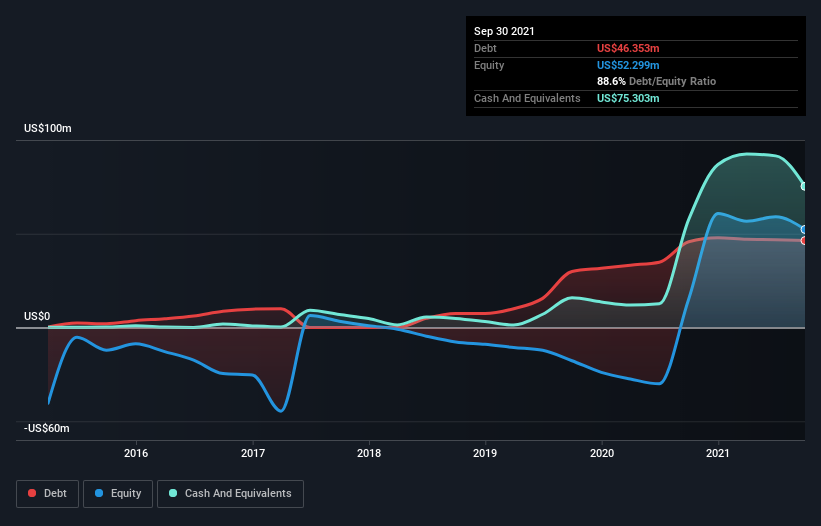Does Ontrak (NASDAQ:OTRK) Have A Healthy Balance Sheet?
Warren Buffett famously said, 'Volatility is far from synonymous with risk.' So it might be obvious that you need to consider debt, when you think about how risky any given stock is, because too much debt can sink a company. We note that Ontrak, Inc. (NASDAQ:OTRK) does have debt on its balance sheet. But the real question is whether this debt is making the company risky.
Why Does Debt Bring Risk?
Debt is a tool to help businesses grow, but if a business is incapable of paying off its lenders, then it exists at their mercy. In the worst case scenario, a company can go bankrupt if it cannot pay its creditors. However, a more frequent (but still costly) occurrence is where a company must issue shares at bargain-basement prices, permanently diluting shareholders, just to shore up its balance sheet. Of course, debt can be an important tool in businesses, particularly capital heavy businesses. The first step when considering a company's debt levels is to consider its cash and debt together.
Check out our latest analysis for Ontrak
What Is Ontrak's Net Debt?
The chart below, which you can click on for greater detail, shows that Ontrak had US$46.4m in debt in September 2021; about the same as the year before. However, its balance sheet shows it holds US$75.3m in cash, so it actually has US$29.0m net cash.
A Look At Ontrak's Liabilities
Zooming in on the latest balance sheet data, we can see that Ontrak had liabilities of US$15.9m due within 12 months and liabilities of US$47.6m due beyond that. On the other hand, it had cash of US$75.3m and US$10.5m worth of receivables due within a year. So it actually has US$22.2m more liquid assets than total liabilities.
This surplus liquidity suggests that Ontrak's balance sheet could take a hit just as well as Homer Simpson's head can take a punch. On this view, lenders should feel as safe as the beloved of a black-belt karate master. Simply put, the fact that Ontrak has more cash than debt is arguably a good indication that it can manage its debt safely. When analysing debt levels, the balance sheet is the obvious place to start. But ultimately the future profitability of the business will decide if Ontrak can strengthen its balance sheet over time. So if you want to see what the professionals think, you might find this free report on analyst profit forecasts to be interesting.
In the last year Ontrak wasn't profitable at an EBIT level, but managed to grow its revenue by 58%, to US$103m. Shareholders probably have their fingers crossed that it can grow its way to profits.
So How Risky Is Ontrak?
Statistically speaking companies that lose money are riskier than those that make money. And we do note that Ontrak had an earnings before interest and tax (EBIT) loss, over the last year. And over the same period it saw negative free cash outflow of US$16m and booked a US$29m accounting loss. Given it only has net cash of US$29.0m, the company may need to raise more capital if it doesn't reach break-even soon. Ontrak's revenue growth shone bright over the last year, so it may well be in a position to turn a profit in due course. Pre-profit companies are often risky, but they can also offer great rewards. When analysing debt levels, the balance sheet is the obvious place to start. But ultimately, every company can contain risks that exist outside of the balance sheet. Be aware that Ontrak is showing 4 warning signs in our investment analysis , you should know about...
At the end of the day, it's often better to focus on companies that are free from net debt. You can access our special list of such companies (all with a track record of profit growth). It's free.
Have feedback on this article? Concerned about the content? Get in touch with us directly. Alternatively, email editorial-team (at) simplywallst.com.
This article by Simply Wall St is general in nature. We provide commentary based on historical data and analyst forecasts only using an unbiased methodology and our articles are not intended to be financial advice. It does not constitute a recommendation to buy or sell any stock, and does not take account of your objectives, or your financial situation. We aim to bring you long-term focused analysis driven by fundamental data. Note that our analysis may not factor in the latest price-sensitive company announcements or qualitative material. Simply Wall St has no position in any stocks mentioned.



